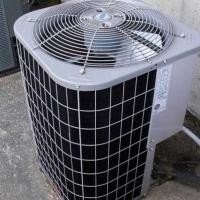
HVAC / Air Conditioning: A Quick Primer and History
Find Out Where YOUR Home is Losing Energy:
Heating, Ventilation, and Air Conditioning (HVAC) systems consist of a central unit that controls the temperature and humidity throughout a building. Using ducts throughout the building, a central HVAC unit heats or cools your home to the temperature of your choice.
HVAC systems now come standard in virtually all newly built or remodeled commercial or residential buildings in the United States. HVAC system air conditioners are often known by the term "central air," as opposed to the earlier technology of window air conditioner units.
Unlike window units, integrated HVAC systems take a whole-house approach to heating, ventilation and air conditioning. Smart technology developed over decades helps you achieve your goal of better energy efficiency and greater comfort. Correctly selected and installed HVAC systems that are installed in a well-insulated building will effectively reduce or eliminate hot and cold temperature pockets and keep the interior at a constant temperature.
With their ability to regulate temperature inside, air conditioning and heating have made it feasible to live comfortably in areas of the United States that experience extreme heat or cold. Some of the nation's fastest-growing population centers are heavily dependent on air conditioning and refrigeration.
History of Air Conditioning
Where does this technology come from? Why isn't its inventor's name known far and wide? There's no simple answer: air conditioning has been continually evolved and improved by generations of inventors.
In the 1800s, the brilliant scientist Michael Faraday discovered that when ammonia evaporated, it cooled the air around it in the process. From there, the concept of air conditioning was improved by a series of important discoveries throughout 19th century which focused on improving unit and room refrigeration capabilities for storing and maintaining foodstuffs, replacing the low-tech iceboxes of old.
The modern air conditioner unit was invented in 1902 by Willis Haviland Carrier of Buffalo, New York. Since then, the technology has undergone countless incarnations and improvements as research and scientific knowledge have advanced.
Modern Convenience of Air Conditioning
Practically speaking, modern commerce as we know it could not exist without air conditioning technology. Without refrigeration, trade would be extremely limited, and without heating and cooling technology the settlement of hot and cold climates would be reduced sharply.
HVAC technology represents much more than a simple luxury or convenience item. Modern air conditioning has made life more livable and business more practical and profitable. This important technology has continually evolved since its invention, and will continue to improve as concerns about energy consumption make efficiency more and more important.
Other HVAC solutions:
- HVAC Maintenance: Tips to Keep Your Equipment Running
- What is HVAC? HVAC is an acronym that stands for Heating, Ventilation and Air Conditioning.
- Who Invented Air Conditioning? Air conditioning is a modern convenience that we take for granted.
- How to Choose an HVAC Contractor This article will help you choose an HVAC Contractor.
- Superior HVAC Energy Efficiency By Upgrading Your HVAC System…And Other Fixes
- HVAC: What is it? The Basics Explained
- HVAC Design: The Importance of Properly Sized HVAC Equipment
- HVAC / Air Conditioning: A Quick Primer and History
- Sizing Up HVAC Prices: How to Choose the Right Air Conditioner
We were unaware of what was involved in an energy audit and your audior took the time to explain everything. We were impressed with the report which told us the areas in which we need to take action on. He never pressured us to use any particular contractors, he just suggested that we go to the Building Energy Pros web site to select contractors of our own choice. He did an excellent job and we HIGHLY recommend the Building Energy Pros. We already have recommended them to several of our neighbors. Again, EXCELLENT JOB!
Cynthia Simpson
The Building Energy Pros auditor was very knowledgeable. I was VERY HAPPY with him. He promptly E-mailed my energy audit report to me and I will consider all of his recommendations.
Tom McGee
We found out that our house really has no energy problems. We are happy to know that we
Leslie Stewart
I was very satisfied with your energy auditor. He was very qualified and spent a great deal of time with me. The energy audit was very informative.
P.B.
The energy auditor was very good and helpful. He keeps in touch with me to answer any of my questions.
D.G.
I was very satisfied with my energy audit. The auditor gave me some tips on attic insulation that were very helpful.
R.G.
I was very satisfied with my energy audit. Thank you!
R.S.
Very good service! I am going to replace the windows as the auditor had suggested.
D.W.
I was very happy with the energy audit. THANKS!
A. M.
My energy audit was very helpful. Joe Dempsey, your auditor, identified some structural problems that I was not aware of and explained to me why I need more insulation.
J. F.
The auditor was EXCELLENT! He spent ALOT of time with me. I am going to take 3 to 4 of his suggestions and correct these small items to save on my energy bills.
M. B.
The auditor did a GREAT JOB! He knew a lot about older homes, which we have. The report was very comprehensive. Thank you!
Vicki Nez/at
Your energy auditor was very nice and helpful. He answered all of our questions. We will recommend Building Energy Pros to our friends and neighbors.
Katherine McCaffrey
The auditor did a TERRIFIC JOB! The report was FANTASTIC! I will make all the repairs he suggested. I will definitely recommend him to everyone I know that could benefit from a home energy audit.
Steve Sleigh, Chevy Chase
The energy auditor was very professional and I am very satisfied with both the energy audit and the report I received. I will be referring the Building Energy Pros.
Tim Clary
I was very satisfied with the auditor. He was great and gave me some very valuable information. I will refer him to people I know who may need a home energy audit.
Willie Gantt
Your home energy audit proved to be very informative and helpful. I was not aware of the updraft created inside our walls because of the balloon framing construction. You said that that can cause heat to be pulled out of the house with the draft going up inside the walls and should be re-mediated. You also said that the attic insulation was insufficient and that fiberglass batts can leave spaces for around the edges causing heat loss and that it should have blown in insulation on top of what was there to seal the whole attic and increase the r factor. After going over your findings and telling me how you would fix the problems you told me how I could do it myself with stuff from the Home Center and for a quarter of the cost. Well, I did. I went into the basement and filled the bottom of the wall joist with unfaced insulation where they set on the sill plate. I then cut one inch foam board the size for each space and set it in and the sealed the edges of that with expanding foam as well as the sill plate to the foundation. I also sealed the sill plate to the foundation where the joist ran along it, as well as the top of those joist where it made contact with the subflooring. Next I went to the home center and rented their blown insulation machine and got ten bales of the insulation. I filled the attic on top of the batt insulation with about six inches giving another r-19 factor on top of the r-19 that was there. You said that the blown in would also help seal the heat loss around the edges of the batt. The work in the basement cost $144.00 and the work in the attic cost $328.00. After the 30% federal energy tax credit it will end up costing me about $330.00, which you said I should recover in savings in the first year. Thank You for all your advice and expertise. You made me aware of things I should consider and did.
Tommy Thompson


